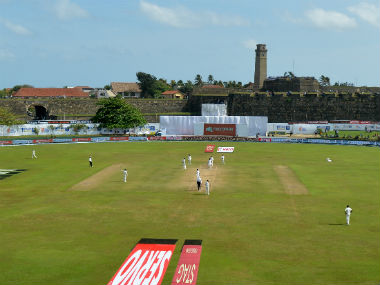The buzz word for bookies, fixers and punters is not ‘match-fixing’. This aspect comes across clearly in the Al Jazeera
sting where the alleged fixer is contemptuously dismissive of match-fixing. With the finality of a mathematical professor theorising the arithmetical probability of the many ways a coin can fall, the alleged fixer brushes off match-fixing as a waste of time as there are only two results possible: win or lose. Instead, he points to the hundreds of opportunities available through spot-fixing, which in turn leads to a massive turnover of stake money right through the match. This is where the real money is, he seems to be telling the ‘sting journalist’ while offering to sell a module or a piece of the action. [caption id=“attachment_4488327” align=“alignleft” width=“380”] Galle International Stadium, Sri Lanka too came under the scanner, where the pitches were allegedly doctored. AFP[/caption] “We’ll inform you what your particular ‘spot-fix’ is going to be on the morning of the match. Further, just a few minutes before the situational fix (full toss/no-ball/defensive play, etc) is to be activated, we’ll alert you. You can immediately spring into action and make crores of money till the end of that module,” he seemed to be suggesting. Of course the situational fix is for a batsman not scoring more than a certain number of runs in an over or session or innings, etc. The terms for a bowler could be for a no-ball or wide or full toss or bouncer, etc. The ‘fix’, it would seem, can be woven into the match, particularly as any batsman or bowler could suffer from momentary lapse of concentration or touch or form. It is the supposedly ‘harmless’ nature of a spot-fix that gets players sucked into it, especially when mega bucks are offered in return, because it is plausible for batsmen at the crease to ‘down the shutters’ before lunch or tea or close of play in a Test. The English media, which in the past had no hesitation in rubbishing Pakistani and other cricketers, quickly closed ranks when the charge was made against their own countrymen. The sting which did not name the three English cricketers (possibly as a protection against defamation charges), had no such compulsion when it came to identifying Sri Lanka curators, cricketers or a former Indian first class player or even purported members of Indian betting syndicates. Interestingly the Mumbai ex-cricketer claimed that the television channel had approached him for a role in a serial. He was thus engaged with them in a pilot project. He claimed he had nothing to do with any fixing other than the screen test he was auditioning. If you thought that response was something, it was England’s collective response to the charge that three of their players had been exposed by the sting that seemed downright bizarre. One response actually defended the fixer. It said he might have told tall stories when shown a suitcase full of money! Apparently the fixer had said that in a 10-over frame in the Chennai Test England’s batsmen would not score more than a certain number of runs. When that came about, the English media said that it was impossible to deduce whether the fixer being right was owing to ‘crude lies or clever guesses.’ Of course the batsmen’s names were not revealed. However, because the instances mentioned in the matches were plausible, ICC stated that it would run a detailed investigation. That, of course, was dependent on the channel co-operating. Non cooperation, it was believed, might be because of potential legal complications. Even if the channel goes for a shoot and scoot option, it is important that the ICC itself does a lot more to get to the root of fixing. It can’t simply sit back and wait for media houses to break match-fixing stories and then try and look busy. For starters, the apex cricketing body needs to find ways and means to get various countries to have strict anti-fixing laws in place. For instance, fixing a match in India is not an offence. There is no law or clause against it. Match-fixers can get away unscathed, unless they get stuck in money laundering or racketeering or cheating cases. No Indian cricketers or curators were named in this particular sting report. It is possible that India’s anti-corruption moves have been stringent and successful. Alternately the Indian players are making so much money legitimately that it would seem foolish for them to jeopardise that. England, on the other hand, would be shaken by the news of the involvement of some of their players. Coming soon after England’s shock defeat against Pakistan at home many would be wondering if all was kosher with the team. It is also possible that the fixers are feeling so emboldened that they want more of the action. The sting reveals that there are moves afoot to float another 4-team T20 league that could be taken across UAE before entering Hong Kong, Nepal and Sri Lanka. Lest ICC’s anti-corruption unit pat itself on the back, claiming that its ‘air-tight policy’ had forced fixers to try and promote their own league, it could be pointed out that the syndicate itself had become so successful that it had been trying to acquire its very own lucrative cash cow! Now that’s not a very comforting thought for the ICC!
Fixing a match in India is not an offence. There is no law or clause against it. Match-fixers can get away unscathed, unless they get stuck in money laundering or racketeering or cheating cases.
Advertisement
End of Article


)

)
)
)
)
)
)
)
)



